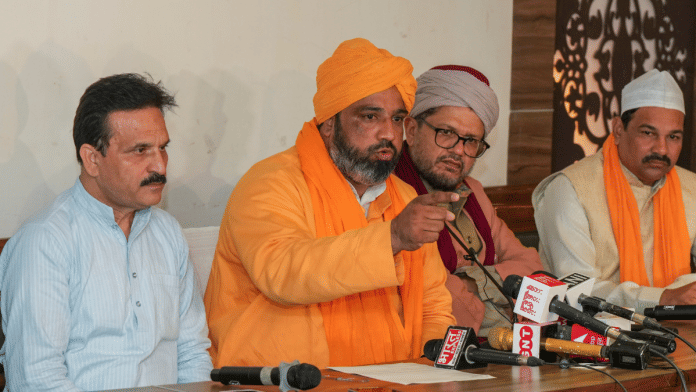New Delhi: Welcoming the Centre’s plan to amend the Waqf Act, the All India Sufi Sajjadanashin Council (AISSC) Tuesday said that dargahs are the biggest victim of the powers given to waqf boards in states and Union Territories under this legislation.
It also demanded that there should either be a separate board for dargahs or the amended Act clearly defines the position of the dargah and rules to protect its traditions.
The Modi government plans to amend the Act, which came in 1995 after repealing the 1954 Act and was later amended in 2013, to curb the power of waqf boards that allow them to declare properties as assets, according to media reports.
The Union Cabinet has reportedly approved 40 amendments in the Act, including scrutiny of the property to ascertain if it is a waqf asset or not, and mandatory registration with district collectors, among others.
The government is likely to table the Waqf Act Amendment Bill in the ongoing Parliament session, Union Minority Affairs and Parliamentary Affairs Minister Kiren Rijiju told reporters Monday.
There are around 8.7 lakh waqf properties spread over 9 lakh acres across the country.
The proposed amendment has led to a row with the Opposition and a large section of Muslim organisations, including religious bodies, accusing the Modi government of trying to snatch the rights of Muslims and change the status of Waqf properties. But a section of the Muslim community has come out in support of the changes, saying that it was the need of the hour.
AISSC chairman Syed Naseruddin Chishty said there is an urgent need to bring transparency in the functioning of the Waqf boards, which have been enjoying “absolute powers” after the amendment in the Act in 2013.
“There is massive corruption in waqf boards. In the name of survey, the waqf boards are declaring properties as waqf assets. Their officials have become dictators. In the name of survey, they arbitrarily declare properties belonging to Muslims as waqf assets. With 70-80 percent of the waqf properties belonging to daraghs, we are the main stakeholders. But we are the biggest victim of the powers given to the waqf board under the present Act. The amendment is the need of the hour,” said Chishty, who is the successor of present spiritual head of Ajmer Sharif daragh.
The AISSC represents the voices of over 800 dargahs in India.
Chishty said that the association Monday gave a representation to National Security Advisor Ajit Doval regarding the need for amendment in the Act and also held a meeting with Rijiju.
In a post on ‘X’ Tuesday, Rijiju informed that he met an AISSC delegation and discussed issues concerning the Muslim community.
Last evening a delegation of the All India Sufi Sajjadanashin Council (AISSC) comprising of the most revered & prominent Sajjadanashins from various Dargahs across India met me under the leadership of Shri Syed Naseruddin Chishty, Chairman & Successor of the Present Spiritual… pic.twitter.com/Pzjzpg1tgh
— Kiren Rijiju (@KirenRijiju) August 6, 2024
“In the present Act, there is no mention of dargahs. We have Sufi tradition which needs to be mentioned in the Act and protected. Currently, we need permission from the waqf board to carry out any development work at the dargah for improving facilities for visitors. The land with dargah was donated by followers, but the waqf boards declare them to be their assets. Due to the present rules, waqf boards get 7 percent of the income,” Chishty said at a press briefing in Delhi.
The association slammed those religious outfits who were opposing the amendments, saying that it was not the first time an amendment was being made in the Act.
“The previous governments brought a new Act in 1995 and made amendments in 2013, giving absolute power to waqf boards. We should wait to see the amendments proposed by the government. This is being done to bring in transparency in the functioning of the waqf boards, which have become a den of corruption,” said Syed Farid Ahmed Nizami, custodian and spiritual successor of Dargah Hazrat Nizamuddin.
At the same time, AISSC members said that there should be consultations with the community before amending the law. “We don’t know what amendments are proposed in the bill. But there should be stakeholder consultations,” said Chishty.
Divisions over amendment
Islamic organisations such as All India Muslim Personal Law Board, Jamiat Ulama-i-Hind among others have opposed the government’s move to amend the Act, saying that it wants to change the status and nature of waqf properties.
Jamiat Ulama-i-Hind president Arshad Madani said that waqf properties are donations done by Muslim elders and are dedicated for religious charitable works for the community.
“Any change in the Waqf Act 2013, which changes the status and nature of waqf properties or makes it easier for the government or any individual to misuse them, is not acceptable. Similarly, we cannot accept any amendment of reducing or limiting the powers of waqf boards…. The intention of the government is bad; it wants to interfere in our religious issues, and it wants to usurp billions of properties of Muslims,” Madani said in a statement Monday.
But the AISSC members questioned those opposing the amendments, alleging that the boards have misused their powers to declare properties owned by Muslims as waqf property.
“They (Boards) have been working in an arbitrary manner. There are so many people who have been fighting cases in the courts. The amendments in 2013 gave the waqf boards absolute powers, which needs to be relooked at,” said Arshad Farid, successor of spiritual head of Fatehpur Sikri dargah.
(Edited by Tony Rai)
Also Read: Once-powerful AIMPLB is battling multiple crises. Internal strife, calls for reforms and UCC






